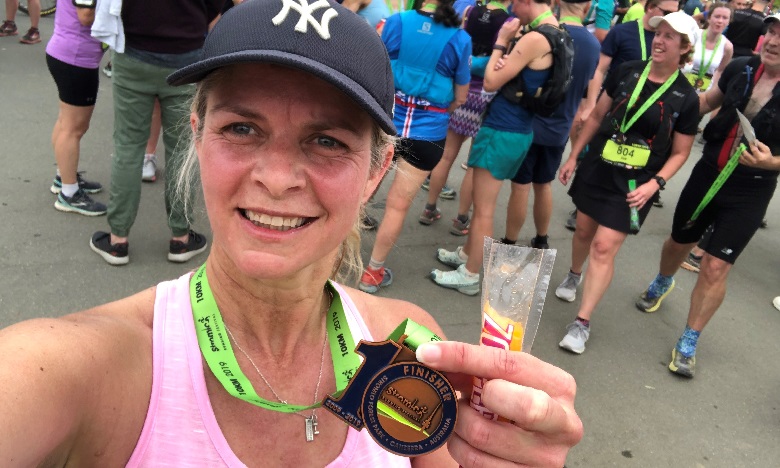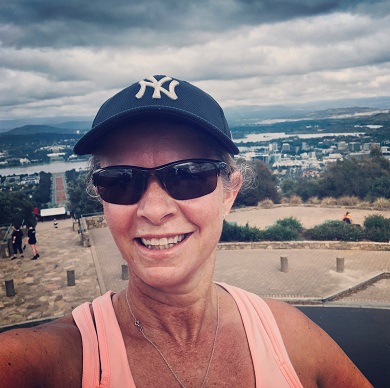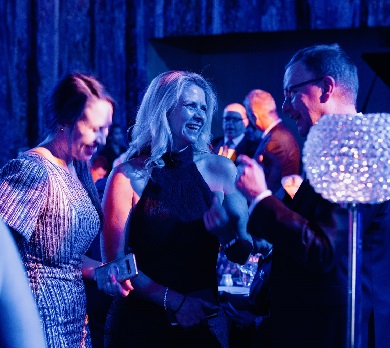Chronic blood cancer diagnosis sparks Mel’s passion for awareness

Since receiving a shock chronic myeloid leukaemia (CML) diagnosis in July 2020, Mel Harris has learnt quickly that the so-called ‘invisible cancer’ can have everyday impacts beyond what many would expect.
Mel had been feeling unwell for months in the lead up to her diagnosis, always cold to the bone, constantly tired, experiencing night sweats and “horrific” back pain.
“I just explained everything away – thinking it was menopause, maybe depression or just the huge year we were having with the global pandemic,” explained the 47-year-old from Canberra.
“The first week of July, things got worse and I couldn’t physically get out of bed. My 18-year-old daughter, Mackenzie said to me, ‘Mum, I’m really worried’.
“That was enough to kick me into gear and I went to the gym the next day. Not long after I started exercising, I passed out and was taken to hospital!”
Mel was taken to the emergency department where she was first told she had acute myeloid leukaemia (AML).

“I spent the next couple hours Googling the disease, reading about poor prognoses and aggressive treatment regimens – that was really scary,” said Mel.
“I then got transferred to a different hospital in Canberra to have a bone marrow biopsy and the morning after, the haematologist was able to confirm that it was actually chronic myeloid leakaemia (CML).
“Within about 18 hours, I’d gone from feeling like I could smash out a gym session to being diagnosed with a blood cancer.”
Mel was relieved when the haematologist explained that CML was an entirely manageable blood cancer which most people live with for the rest of their life and rarely die from.
“I was just thanking god, because Mackenzie wasn’t quite 18 at the time, it’s just the two of us and she was in the midst of finishing grade 12,” said Mel.
“My haematologist has been really good, explaining the full history of CML drugs. He’s been around for a while and told me how he could remember when this ‘miracle drug’ called imatinib was in clinical trials.”
Since starting on imatinib, Mel has experienced minor side effects of night-time nausea, bone pain, fluid retention under her eyes, a swollen spleen and neck.
“But my GP and haematologist work well together to address those issues as soon as they come up,” she said.
“It’s not hard to manage and I actually feel really lucky because some of the side effects I’ve read on the online support groups sound horrific.
“I do find the groups good for connecting with others and information sharing. I ran out of my drug one day and I remembered that someone had posted about a great chemist in Canberra who would have stock – that was really helpful.”
A couple of months into treatment, Mel started to feel like herself again and went into her haematologist’s office thinking she would be told she had beaten the leukaemia.
“I had taken my tablet religiously every night at the same time, I’d been exercising again, not drinking alcohol and maintaining a really healthy diet,” said Mel.
“I was having regular blood tests, my white blood counts and haemoglobin were looking really good.
“It had completely eluded me that I would still need leukaemia tests every three months and I would need zero detection of leukaemia to be cleared.
“He said to me, ‘You must remember at the end of the day, you still have blood cancer. Just give yourself a break’.”
Mel works as a capability and change strategist at the Australian Trade and Investment Commission (Austrade) in Canberra.

After her diagnosis she discovered another colleague has chronic lymphocytic leukaemia (CLL).
“We call each other blood brother and sister and we always check in on each other,” said Mel.
“You obviously don’t want anyone to have cancer but it’s actually really nice to have somebody at work, in a senior role, who understands what it’s like.”
Mel finds one of the hardest parts of living with a chronic disease is that from the outside, it looks like nothing is wrong.
“You feel like you need to be more positive and put on a brave face, especially when telling people, to allay their fears and worries for you,” said Mel.
“I’ve become quite passionate about chronic illness now, not just leukaemia, but other diseases like diabetes.
“I have another friend at work who is diabetic, and he said there was a study that found they need to make around 180 diabetes-related decisions per day.
“While you’re not going in and having chemotherapy for weeks on end, you need to think about your CML every day and that becomes exhausting.”
“I want to raise awareness that just because someone might not look physically sick, it doesn’t mean they’re not struggling and that needs to be acknowledged more.”
Mel will take part in this year’s Light the Night event to raise awareness and mark her special milestone; exactly three months since starting her blood cancer journey.
“Even though the event is online this year, I think I’ll still do a walk around Canberra if it’s nice weather and listen in on my phone to mark the moment.
“I think it’s really important to recognise what I’ve been through and feel a sense of achievement that I’ve made it this far.”
Her sights are now firmly set on her future work with Austrade including her role as Indigenous Co-Champion.
Last updated on November 12th, 2020
Developed by the Leukaemia Foundation in consultation with people living with a blood cancer, Leukaemia Foundation support staff, haematology nursing staff and/or Australian clinical haematologists. This content is provided for information purposes only and we urge you to always seek advice from a registered health care professional for diagnosis, treatment and answers to your medical questions, including the suitability of a particular therapy, service, product or treatment in your circumstances. The Leukaemia Foundation shall not bear any liability for any person relying on the materials contained on this website.